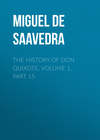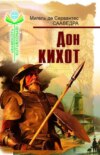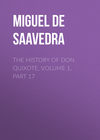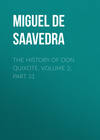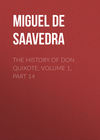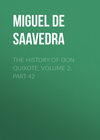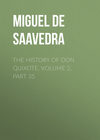Kitobni o'qish: «The History of Don Quixote, Volume 1, Part 15»
CHAPTER XLII.
WHICH TREATS OF WHAT FURTHER TOOK PLACE IN THE INN, AND OF SEVERAL OTHER THINGS WORTH KNOWING
With these words the captive held his peace, and Don Fernando said to him, "In truth, captain, the manner in which you have related this remarkable adventure has been such as befitted the novelty and strangeness of the matter. The whole story is curious and uncommon, and abounds with incidents that fill the hearers with wonder and astonishment; and so great is the pleasure we have found in listening to it that we should be glad if it were to begin again, even though to-morrow were to find us still occupied with the same tale." And while he said this Cardenio and the rest of them offered to be of service to him in any way that lay in their power, and in words and language so kindly and sincere that the captain was much gratified by their good-will. In particular Don Fernando offered, if he would go back with him, to get his brother the marquis to become godfather at the baptism of Zoraida, and on his own part to provide him with the means of making his appearance in his own country with the credit and comfort he was entitled to. For all this the captive returned thanks very courteously, although he would not accept any of their generous offers.
By this time night closed in, and as it did, there came up to the inn a coach attended by some men on horseback, who demanded accommodation; to which the landlady replied that there was not a hand's breadth of the whole inn unoccupied.
"Still, for all that," said one of those who had entered on horseback, "room must be found for his lordship the Judge here."
At this name the landlady was taken aback, and said, "Senor, the fact is I have no beds; but if his lordship the Judge carries one with him, as no doubt he does, let him come in and welcome; for my husband and I will give up our room to accommodate his worship."
"Very good, so be it," said the squire; but in the meantime a man had got out of the coach whose dress indicated at a glance the office and post he held, for the long robe with ruffled sleeves that he wore showed that he was, as his servant said, a Judge of appeal. He led by the hand a young girl in a travelling dress, apparently about sixteen years of age, and of such a high-bred air, so beautiful and so graceful, that all were filled with admiration when she made her appearance, and but for having seen Dorothea, Luscinda, and Zoraida, who were there in the inn, they would have fancied that a beauty like that of this maiden's would have been hard to find. Don Quixote was present at the entrance of the Judge with the young lady, and as soon as he saw him he said, "Your worship may with confidence enter and take your ease in this castle; for though the accommodation be scanty and poor, there are no quarters so cramped or inconvenient that they cannot make room for arms and letters; above all if arms and letters have beauty for a guide and leader, as letters represented by your worship have in this fair maiden, to whom not only ought castles to throw themselves open and yield themselves up, but rocks should rend themselves asunder and mountains divide and bow themselves down to give her a reception. Enter, your worship, I say, into this paradise, for here you will find stars and suns to accompany the heaven your worship brings with you, here you will find arms in their supreme excellence, and beauty in its highest perfection."
The Judge was struck with amazement at the language of Don Quixote, whom he scrutinized very carefully, no less astonished by his figure than by his talk; and before he could find words to answer him he had a fresh surprise, when he saw opposite to him Luscinda, Dorothea, and Zoraida, who, having heard of the new guests and of the beauty of the young lady, had come to see her and welcome her; Don Fernando, Cardenio, and the curate, however, greeted him in a more intelligible and polished style. In short, the Judge made his entrance in a state of bewilderment, as well with what he saw as what he heard, and the fair ladies of the inn gave the fair damsel a cordial welcome. On the whole he could perceive that all who were there were people of quality; but with the figure, countenance, and bearing of Don Quixote he was at his wits' end; and all civilities having been exchanged, and the accommodation of the inn inquired into, it was settled, as it had been before settled, that all the women should retire to the garret that has been already mentioned, and that the men should remain outside as if to guard them; the Judge, therefore, was very well pleased to allow his daughter, for such the damsel was, to go with the ladies, which she did very willingly; and with part of the host's narrow bed and half of what the Judge had brought with him, they made a more comfortable arrangement for the night than they had expected.
The captive, whose heart had leaped within him the instant he saw the Judge, telling him somehow that this was his brother, asked one of the servants who accompanied him what his name was, and whether he knew from what part of the country he came. The servant replied that he was called the Licentiate Juan Perez de Viedma, and that he had heard it said he came from a village in the mountains of Leon. From this statement, and what he himself had seen, he felt convinced that this was his brother who had adopted letters by his father's advice; and excited and rejoiced, he called Don Fernando and Cardenio and the curate aside, and told them how the matter stood, assuring them that the judge was his brother. The servant had further informed him that he was now going to the Indies with the appointment of Judge of the Supreme Court of Mexico; and he had learned, likewise, that the young lady was his daughter, whose mother had died in giving birth to her, and that he was very rich in consequence of the dowry left to him with the daughter. He asked their advice as to what means he should adopt to make himself known, or to ascertain beforehand whether, when he had made himself known, his brother, seeing him so poor, would be ashamed of him, or would receive him with a warm heart.
"Leave it to me to find out that," said the curate; "though there is no reason for supposing, senor captain, that you will not be kindly received, because the worth and wisdom that your brother's bearing shows him to possess do not make it likely that he will prove haughty or insensible, or that he will not know how to estimate the accidents of fortune at their proper value."
"Still," said the captain, "I would not make myself known abruptly, but in some indirect way."
"I have told you already," said the curate, "that I will manage it in a way to satisfy us all."
By this time supper was ready, and they all took their seats at the table, except the captive, and the ladies, who supped by themselves in their own room. In the middle of supper the curate said:
"I had a comrade of your worship's name, Senor Judge, in Constantinople, where I was a captive for several years, and that same comrade was one of the stoutest soldiers and captains in the whole Spanish infantry; but he had as large a share of misfortune as he had of gallantry and courage."
"And how was the captain called, senor?" asked the Judge.
"He was called Ruy Perez de Viedma," replied the curate, "and he was born in a village in the mountains of Leon; and he mentioned a circumstance connected with his father and his brothers which, had it not been told me by so truthful a man as he was, I should have set down as one of those fables the old women tell over the fire in winter; for he said his father had divided his property among his three sons and had addressed words of advice to them sounder than any of Cato's. But I can say this much, that the choice he made of going to the wars was attended with such success, that by his gallant conduct and courage, and without any help save his own merit, he rose in a few years to be captain of infantry, and to see himself on the high-road and in position to be given the command of a corps before long; but Fortune was against him, for where he might have expected her favour he lost it, and with it his liberty, on that glorious day when so many recovered theirs, at the battle of Lepanto. I lost mine at the Goletta, and after a variety of adventures we found ourselves comrades at Constantinople. Thence he went to Algiers, where he met with one of the most extraordinary adventures that ever befell anyone in the world."
Here the curate went on to relate briefly his brother's adventure with Zoraida; to all which the Judge gave such an attentive hearing that he never before had been so much of a hearer. The curate, however, only went so far as to describe how the Frenchmen plundered those who were in the boat, and the poverty and distress in which his comrade and the fair Moor were left, of whom he said he had not been able to learn what became of them, or whether they had reached Spain, or been carried to France by the Frenchmen.
The captain, standing a little to one side, was listening to all the curate said, and watching every movement of his brother, who, as soon as he perceived the curate had made an end of his story, gave a deep sigh and said with his eyes full of tears, "Oh, senor, if you only knew what news you have given me and how it comes home to me, making me show how I feel it with these tears that spring from my eyes in spite of all my worldly wisdom and self-restraint! That brave captain that you speak of is my eldest brother, who, being of a bolder and loftier mind than my other brother or myself, chose the honourable and worthy calling of arms, which was one of the three careers our father proposed to us, as your comrade mentioned in that fable you thought he was telling you. I followed that of letters, in which God and my own exertions have raised me to the position in which you see me. My second brother is in Peru, so wealthy that with what he has sent to my father and to me he has fully repaid the portion he took with him, and has even furnished my father's hands with the means of gratifying his natural generosity, while I too have been enabled to pursue my studies in a more becoming and creditable fashion, and so to attain my present standing. My father is still alive, though dying with anxiety to hear of his eldest son, and he prays God unceasingly that death may not close his eyes until he has looked upon those of his son; but with regard to him what surprises me is, that having so much common sense as he had, he should have neglected to give any intelligence about himself, either in his troubles and sufferings, or in his prosperity, for if his father or any of us had known of his condition he need not have waited for that miracle of the reed to obtain his ransom; but what now disquiets me is the uncertainty whether those Frenchmen may have restored him to liberty, or murdered him to hide the robbery. All this will make me continue my journey, not with the satisfaction in which I began it, but in the deepest melancholy and sadness. Oh dear brother! that I only knew where thou art now, and I would hasten to seek thee out and deliver thee from thy sufferings, though it were to cost me suffering myself! Oh that I could bring news to our old father that thou art alive, even wert thou the deepest dungeon of Barbary; for his wealth and my brother's and mine would rescue thee thence! Oh beautiful and generous Zoraida, that I could repay thy good goodness to a brother! That I could be present at the new birth of thy soul, and at thy bridal that would give us all such happiness!"
All this and more the Judge uttered with such deep emotion at the news he had received of his brother that all who heard him shared in it, showing their sympathy with his sorrow. The curate, seeing, then, how well he had succeeded in carrying out his purpose and the captain's wishes, had no desire to keep them unhappy any longer, so he rose from the table and going into the room where Zoraida was he took her by the hand, Luscinda, Dorothea, and the Judge's daughter following her. The captain was waiting to see what the curate would do, when the latter, taking him with the other hand, advanced with both of them to where the Judge and the other gentlemen were and said, "Let your tears cease to flow, Senor Judge, and the wish of your heart be gratified as fully as you could desire, for you have before you your worthy brother and your good sister-in-law. He whom you see here is the Captain Viedma, and this is the fair Moor who has been so good to him. The Frenchmen I told you of have reduced them to the state of poverty you see that you may show the generosity of your kind heart."
The captain ran to embrace his brother, who placed both hands on his breast so as to have a good look at him, holding him a little way off but as soon as he had fully recognised him he clasped him in his arms so closely, shedding such tears of heartfelt joy, that most of those present could not but join in them. The words the brothers exchanged, the emotion they showed can scarcely be imagined, I fancy, much less put down in writing. They told each other in a few words the events of their lives; they showed the true affection of brothers in all its strength; then the judge embraced Zoraida, putting all he possessed at her disposal; then he made his daughter embrace her, and the fair Christian and the lovely Moor drew fresh tears from every eye. And there was Don Quixote observing all these strange proceedings attentively without uttering a word, and attributing the whole to chimeras of knight-errantry. Then they agreed that the captain and Zoraida should return with his brother to Seville, and send news to his father of his having been delivered and found, so as to enable him to come and be present at the marriage and baptism of Zoraida, for it was impossible for the Judge to put off his journey, as he was informed that in a month from that time the fleet was to sail from Seville for New Spain, and to miss the passage would have been a great inconvenience to him. In short, everybody was well pleased and glad at the captive's good fortune; and as now almost two-thirds of the night were past, they resolved to retire to rest for the remainder of it. Don Quixote offered to mount guard over the castle lest they should be attacked by some giant or other malevolent scoundrel, covetous of the great treasure of beauty the castle contained. Those who understood him returned him thanks for this service, and they gave the Judge an account of his extraordinary humour, with which he was not a little amused. Sancho Panza alone was fuming at the lateness of the hour for retiring to rest; and he of all was the one that made himself most comfortable, as he stretched himself on the trappings of his ass, which, as will be told farther on, cost him so dear.
The ladies, then, having retired to their chamber, and the others having disposed themselves with as little discomfort as they could, Don Quixote sallied out of the inn to act as sentinel of the castle as he had promised. It happened, however, that a little before the approach of dawn a voice so musical and sweet reached the ears of the ladies that it forced them all to listen attentively, but especially Dorothea, who had been awake, and by whose side Dona Clara de Viedma, for so the Judge's daughter was called, lay sleeping. No one could imagine who it was that sang so sweetly, and the voice was unaccompanied by any instrument. At one moment it seemed to them as if the singer were in the courtyard, at another in the stable; and as they were all attention, wondering, Cardenio came to the door and said, "Listen, whoever is not asleep, and you will hear a muleteer's voice that enchants as it chants."
"We are listening to it already, senor," said Dorothea; on which Cardenio went away; and Dorothea, giving all her attention to it, made out the words of the song to be these:
